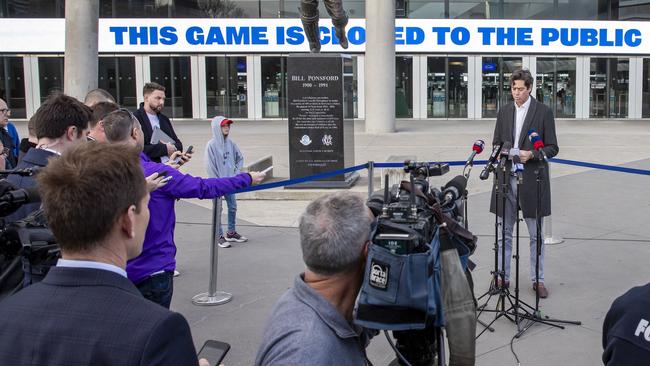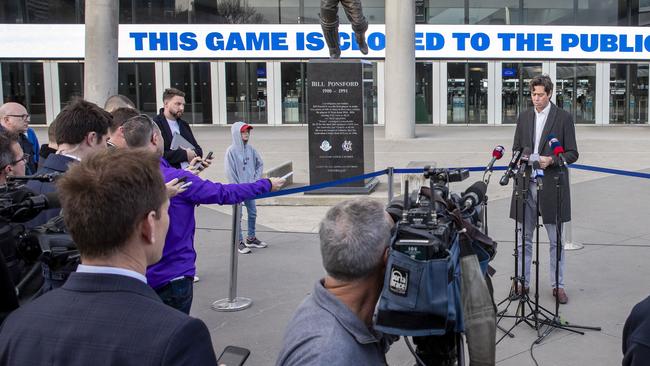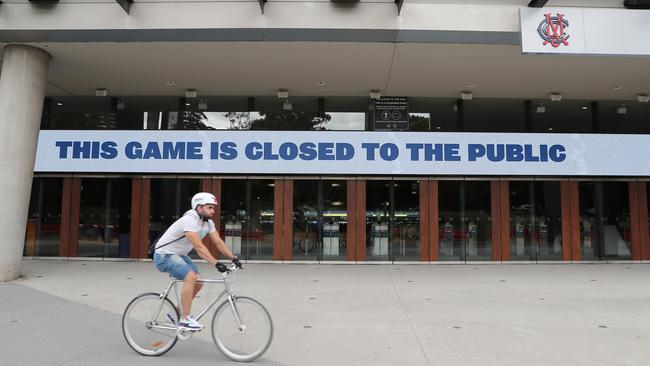Patrick Carlyon: How the pandemic has changed our beloved game of footy
AFL boss Gillon McLachlan and his team have responded nimbly to unknowable permutations during the coronavirus crisis but it’s hard to barrack for your team when you don’t know where they will be playing, who they play against, and if the game will go ahead at all, writes Patrick Carlyon.

Patrick Carlyon
Don't miss out on the headlines from Patrick Carlyon. Followed categories will be added to My News.
Last Sunday, Collingwood’s Steele Sidebottom got drunk, walked out the wrong door, and was picked up by police in a Williamstown street.
Sidebottom hardly reinvented the scope for footballing misdemeanours, nor even committed some terrible act. His misjudged session on the whiskies would ordinarily fade fast from the media waves.
Instead, he received a four-week suspension. Many commentators declared Sidebottom’s punishment was about right.
The other big footy news on Thursday? Players from lockdown suburbs having to move house to be allowed to play. If they don’t, then go to NSW, they could theoretically be sent to jail.
That’s the thing about footy this year. The usual talking points have bowed to the bigger malaise. AFL head Gill McLachlan has piloted a rickety plane that threatens to stall whenever a passenger forgets his seat belt.
Similar doubts about the competition flared a couple of weeks ago when Essendon’s Conor McKenna tested positive to COVID-19. His apparent “crime” was to attend a home inspection.
There will be more transgressions. No one can expect to successfully tether hundreds of young men to oppressive and shifting rules that strand them from their homes and loved ones.
This prevailing overlay has distorted all the usual footballing rhythms. The usual questions about teams, players and contests yield to a bigger one.
It’s an asterisk, a pause button.

How do you invest the usual fanaticism for our beloved game when football’s continuance is held to ransom by an impulsive choice of any one of its players?
From the grassroots, the game has been dented by doubts that have forcibly denied fans their age-old customs.
Five major metropolitan senior competitions have given up trying to play games this year.
No one is preparing for the weekly trip to the MCG for overpriced chips. Or fretting about getting to the front of the queue and back to their seat before the next quarter starts.
Diehards are not attending training sessions in the hope of a chat or an autograph. No one is scheming for grand final tickets because no one really knows when or if the grand final will be.
Usually, by July, the makeup of finals aspirants is becoming clear. We are supposed to be watching round 16 this weekend, an unofficial launch pad for teams to kick, much like a horse race, for the finish line of September finals.
Instead, we are in round five. Players’ skills have dipped because teams have not properly trained together. The spectacle has degenerated into defensive stalemates that lower scores and stultify the emotions of the (fake) crowds.
The momentum of quarters has shifted because of their shortening. Each game seems over before it is due to be, as though the final siren is sounding at the end of the third quarter.
None of this is anyone’s fault. McLachlan and his team have responded nimbly to unknowable permutations. They are playing against an invisible enemy that has muddled all the conventions.
After all, you know the sporting world has toppled from its axis when Nick Kyrgios stands up as tennis’ exemplar of morality by calling out players for ignoring the (virus) rules.
The jolt of the pandemic has had so many unexpected effects. One is that the social glue of football has dimmed in the virus fog.

It’s hard to barrack for your team when you don’t know where they will be playing, who they play against, and if the game will go ahead at all.
There are few obvious formlines to ponder. Even those that can be identified — such as Gold Coast’s energy and excitement — tend to be subsumed in the uncertainty.
The growing inequities of the competition, driven by state government decrees about borders and restrictions, have enveloped the usual dialogues about the sport.
Tribalism has always been the vaulting sentiment that divided suburbs or states, and endowed its adherents with identity and purpose. This has been replaced by the national pile on against disease-ridden Victorians.
Drumming up confected (and amusing) prejudices between Richmond and Melbourne, say, seems misplaced when the notion of Richmond playing Melbourne this Sunday is subject to no new surprises in the meantime.
The winter of discontent thinking — that there must be football, or else — has been since leavened by the search for other distractions. Such as watching documentaries on Michael Jordan or Diego Maradona.
Or grasping the appeal of ice hockey’s brutality and speed. Or tuning in to English Premier League matches and caring whether Liverpool wins the championship.
Football has long been the assumed talking point, the fallback chatter at any water cooler. The near absence of water cooler conversations serves as a kind of marker.
It doesn’t seem to matter right now that football doesn’t matter, not when the game’s tribulations are a sliver of bigger community impacts.
This mindset is foreign to generations of fans and was unimaginable at the start of March. Football has lost its amplified place in our thinking.
When football can reassert its continuity of status, as it will, remains unclear. There is always next year, of course, and a fresh start.
Yet a welcome return to the old may well be furnished with something new, such as an unexpected fondness for soccer and Liverpool.
Patrick Carlyon is a Herald Sun columnist

